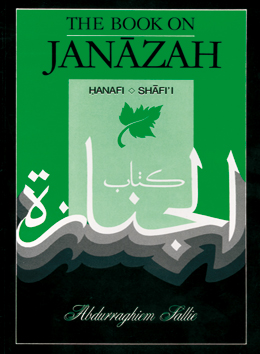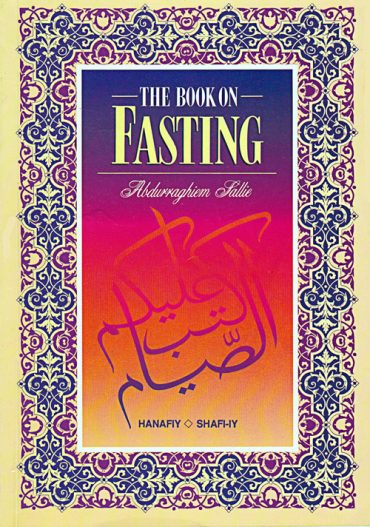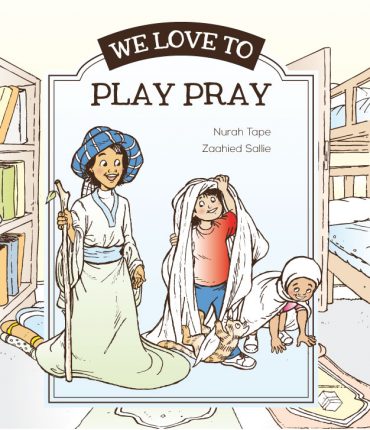-

Abdurraghiem Hasan Sallie
Janazah
by: Abdurraghiem Hasan SallieR69.99

Death is the final separation of the soul from the physical body. In this book, the author provides full details of the final rites to be accorded to the dead, such as instructions for the washing of the corpse. The views from the perspective of the four matha-hib are provided and further elucidates the various aspects of burying a Muslim with dignity. The step by step method of performing the last ghusl (ceremonial bath) to the shrouding (kafan) of the corpse is explained in simple and easy to understand language. A perspective is also provided on crying and lamenting
A perspective is also provided on crying and lamenting over the dead, burying at night, grave exhumation and visiting the graveyard. The iddah of the wife is fully expounded upon. The punishment in the grave and the subject of Tawassul (request/entreaty) and wasilah (medium/intercession) has been added for the serious student or reader of Islamic literature.
SKU: jan-01-s
Publisher: Red Kufi Books
Publish Date: 1989
Page Count: 273
“Janazah” Cancel reply
-
A Comparative Study of Inheritance in Islam by: Abdurraghiem Hasan Sallie R119.99
In this 376-page publication, Abdurraghiem Hasan Sallie provides an insight into the laws pertaining to Inheritance in Islam. Using and translating prepared works by Dr Taha Abdul Aziz Abu al Fadl, an Al-Azhar University professor and one of his teachers, the author not only expounds upon how the shares of inheritance are calculated and allocated but also how those very same laws are compared in relation to other belief systems.
Sketching a background to Islam’s position on the subject, Sallie takes the reader through inheritance laws before the advent of Islam, under the Egyptians, the ancient Greeks, and Romans and in parts of Europe as well as Russia.
For the Muslim reader, he details the laws and ramifications of inheritance according to the four major schools of thought (Madha-hib). Amongst the detail provided in this book is the inheritance of the unborn child as well as the Quranic texts on determining the shortest period of pregnancy, the decree of the inheritance of a missing person as well as that of the illegitimate child. The distinction between the inheritance of a woman and man has valid reasons, according to the Shariah (Islamic law), which is clarified in the book. The compulsory stipulated shares as explained in the Qur’an are diagrammatically explained by way of examples.
This book is certified and endorsed by the Al-Azhar University, Cairo, Egypt.
Excerpt
“If we compare the system of inheritance in Islam with that of other religions on earth, then any honest investigator will come to one conclusion – that the method advanced by Islam has no comparison in its justice and precision. It had no equal before the advent of Islam and neither will it have an equal amongst the most intelligent and advanced communities.”
-
The Supernatural: Fact or Fiction in Islam? by: Abdurraghiem Hasan Sallie R99.99
Islam places serious emphasis on the belief in what God (Allah) decrees. So when man is afflicted with calamities or has important decisions to make in life, who or what does he turn to?
In today’s world where the use of fortune-tellers, sorcery, grave worshipping and witchcraft are so widespread, the author provides an insight into the clear direction Islam takes when it comes to using such avenues in one’s daily existence.
This is in terms of the choices we make and the beliefs or superstitions we almost deem as fact. In doing so we deviate from the Qur’an and the Sunnah (traditions of the Prophet Muhammad ﷺ). The power of prayer to Allah alone, the knowledge of the unseen and astrology are among the issues explored in this 96-page publication. Abdurraghiem Hasan Sallie, a leading Muslim scholar in South Africa, dispels the avenues of the supernatural that govern some people’s lives.
Excerpt
The person who frequents the sorcerer to have his life sorted out is like a drug addict who craves for the next fix to obliterate reality while he is on a high. This is when his muddled brain is so confused that he believes anything that is related to him. This is the time when his senses wave him goodbye and he willingly indulges in black arts. My mission is to warn my Muslim brothers and sisters that those who indulge in the supernatural, for whatever reason, and feel pleased with themselves, could in some cases find themselves outside the fold of Islam. For a Muslim, this is a very serious indictment. It is like being condemned to Eternal Hell”
-
The Book on Fasting by: Abdurraghiem Hasan Sallie R74.99
Fasting is one of the most meritorious acts in Islam. In this book the fiqh (jurisprudence) of fasting, as well as its excellence, virtues and benefits, are expounded upon, which will if read and understood, enhance the observance of fasting to a higher degree, Insha-Allah.
The definitions of fasting, the various types of fasting and its principles and rules are defined. The sighting of the crescent, the manner in which the months of Ramadan and Shawwal becomes official, the viewpoint of the astronomer and the Hakim (judge) are discussed.
Other interesting discussions include fasting on Youmush Shak (the day of doubt), the various viewpoints of Laylatul Qadr, the fifteenth night of Sha’ban (Laylatul Bara-’ah – the night of pardoning of sons), and the days when fasting becomes haram (unlawful), makruh (abominable) and sunnah (recommended).
Fasting during the early days of Islam, actions which nullify the fast such as eating and sexual intercourse as well as the kafarah (atonement) for the transgression are explored. Reasons which make eating permissible during Ramadan and its judgement are discussed with a valuable addition to the book on pregnancy and breast-feeding. A medical perspective on fasting which answers popular questions on fasting has also been added. I’tikaf (intention to remain in a mosque to perform certain actions), Tarawih salah, Eid Salah, the Takbirs and actions sunnah to perform on the day of Eid are explained in detail. The Zakatul Fitr and voluntary sadaqah are expounded upon.
This book has been written from the viewpoints of the Shafi’i and Hanafiyah schools of thought.
Excerpt
Fasting regularly removes the screen that thwarts us from reaching greater and higher spiritual levels. If we look around us, we will find countless people indulging in their every desire and greed. Their greed for wealth, for example, causes a barrier between them and what is honourable. Others overtax their bodies by indulging in everything that arouses their appetite.
How appropriate the statement of some of the sahabah (companions) who said: “Man has not filled a container worse than his stomach.” Jesus used to say to his disciples: “Do not eat much, otherwise you will drink much and your hearts will become hard.”
-
We Love to Play Pray by: Zaahied Sallie, Nurah Tape-Sallie, R99.99
Let’s Play
A colourful story of three siblings who combine their love for playing with praying.
Let’s Pray
In turn, they learn about the qiblah and how the sun and shadows help them determine the times for prayer.
Let’s Play Pray
-
The Laws pertaining to Mosques in Islam by: Abdurraghiem Hasan Sallie R99.99
Every Muslim is a congregant of some mosque and as a result becomes involved in its affairs either directly or indirectly. Since most mosques are governed by or have a Western-orientated constitution, this book examines its constitutionality from an Islamic perspective and assesses its validity as a guide to administering the affairs of a mosque.
Abdurraghiem Hasan Sallie explains the Shariah’s (Islamic Law) guide to good mosque governance, its laws and how to implement them. The principle of consultation (Shura) is impressed upon to be used, without fail, in all discussions, agreements and disagreements. The author uses practical examples from the Sunnah (practices of the Prophet Muhammad) as historical background to the laws about mosques in Islam. In particular, an insight into the establishment of the four great mosques in Islam is provided, and myths about the Ka’bah expelled.
Maintaining simple but architecturally functional structures and not over-beautifying is clarified under discussion on the construction and utilisation of mosques. Guidance on how to appoint an Imam (religious leader) and its criteria, the purpose & sanctity of a mosque, the mosque as a community centre, financial administration of a mosque and the mosque as waqf (communal property) are among the issues expounded upon, from the viewpoint of the four major schools of thought in Islam (Madha-hib).
Excerpt
The mosque is the forum where Muslims are kept informed about local, foreign, environmental, socio-economic, political and world affairs. Here matters of policy are discussed, resolved and disseminated. A veritable host of statements relates that the Prophet’s The mosque served variously as the seat of government, a prison, a court of law, the Treasury, a school, a welfare centre, war office, and for every other matter affecting the socio-economic or religious affairs of its citizens.
Every mosque, constructed the world over, becomes the living heart of its Muslim community. It is a very important symbol of Islam and of pivotal importance to the Islamic system to perform congregational prayers and to propagate the religion. Facing the Qiblah in the mosque provides a Muslim not only with a spiritual direction but also with a social and moral direction. This place of worship is where the concept of equality and fraternity is propagated and practised as preached by Islam.












There are no reviews yet.